Starting a real estate business in Canada can seem like a big challenge, especially with so many things to consider. From navigating the legalities and market trends to figuring out where to even begin, it’s easy to feel overwhelmed. But here’s the good news: you don’t need a massive budget or years of experience to get started. What you need is a solid strategy and the right resources to build a business that’s both profitable and sustainable.
The real estate market in Canada is full of opportunities for those who know where to look, whether it’s residential, commercial, or rental properties. The key is finding a niche that suits your interests and skill set while aligning with current market demands.
In this guide, we’ll learn How to Start a Real Estate Business in Canada and walk you through the essential steps to starting your real estate business in Canada. We’ll focus on practical advice, tips, and actionable strategies to help you hit the ground running and set yourself up for success from day one.
Let’s get started and turn your real estate dreams into reality!
How to Start a Real Estate Business in Canada
Canada’s real estate market is diverse, with each region offering unique opportunities. For instance, Toronto’s bustling urban environment presents different prospects compared to the scenic locales of smaller towns. Staying updated on current trends, such as the increasing demand for housing or the growth in commercial properties, will help you make informed decisions.
Choosing Your Real Estate Niche
Choosing the right focus in the Canadian real estate market is crucial for your success. Let’s delve deeper into some potential niches:
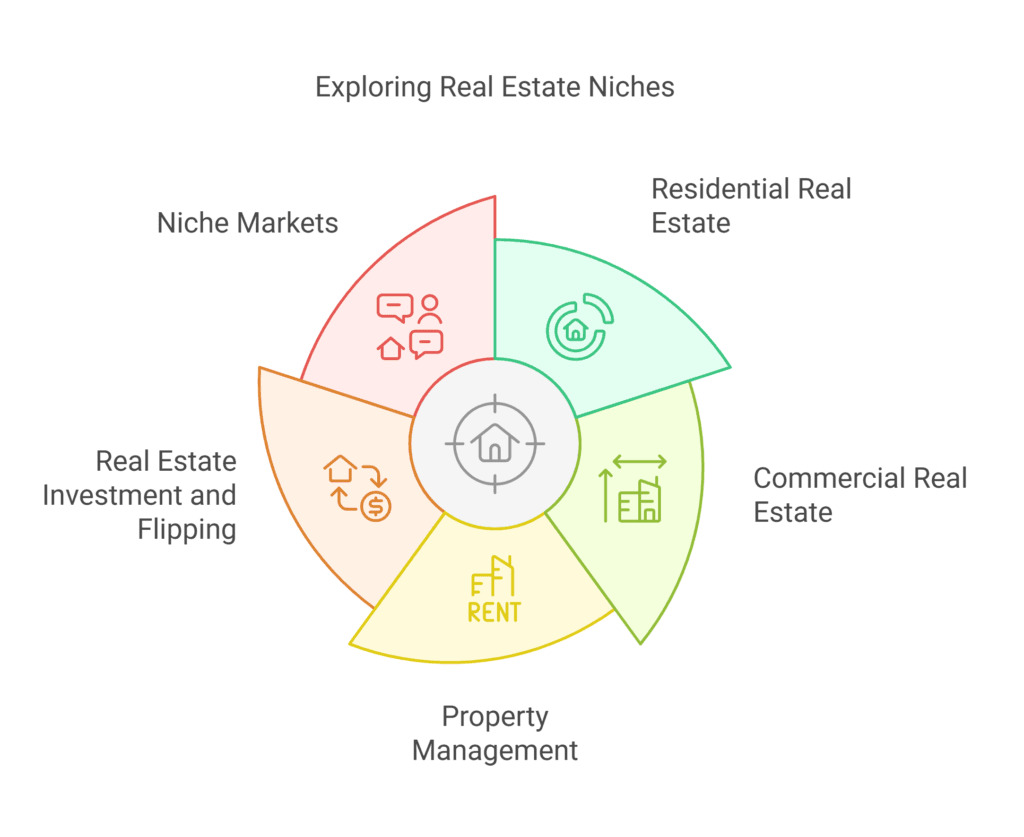
Residential Real Estate
This area involves helping individuals and families buy, sell, or rent homes and condominiums. It’s a broad field that can be further specialized.
- First-Time Homebuyers: Guiding newcomers through the purchasing process, offering education and support.
- Luxury Properties: Dealing with high-end homes that boast premium features and locations.
- Eco-Friendly Homes: Catering to clients interested in sustainable and energy-efficient living spaces.
Commercial Real Estate
This sector focuses on properties used for business purposes, such as offices, retail spaces, and warehouses. It’s ideal if you’re interested in the business side of real estate.
- Office Buildings: Leasing or selling spaces for businesses to operate.
- Retail Spaces: Finding locations for shops, restaurants, and other consumer-facing businesses.
- Industrial Properties: Dealing with warehouses and manufacturing facilities.
Property Management
In this niche, you oversee rental properties, ensuring they are well-maintained and tenants are satisfied. It’s a steady income stream through management fees.
- Residential Rentals: Managing apartments or houses for landlords.
- Commercial Rentals: Overseeing leasing and maintenance of commercial properties.
Real Estate Investment and Flipping
This involves purchasing properties, renovating them, and selling them for a profit. It’s dynamic and can be lucrative with the right strategy.
- Short-Term Flipping: Quick renovations to sell promptly.
- Long-Term Investment: Holding properties to appreciate over time before selling.
Niche Markets
Specializing can set you apart. Consider these options:
- Cottage Country Properties: Focusing on vacation homes in scenic areas, which are in demand for their natural beauty and tranquility.
- Self-Storage Facilities: Investing in or managing storage units, a sector experiencing growth due to increasing demand for storage space.
- Student Housing: Providing accommodations in university towns, catering to the constant influx of students.
Creating a Winning Business Plan
A well-thought-out business plan serves as your roadmap. Here’s a concise breakdown of the key components:
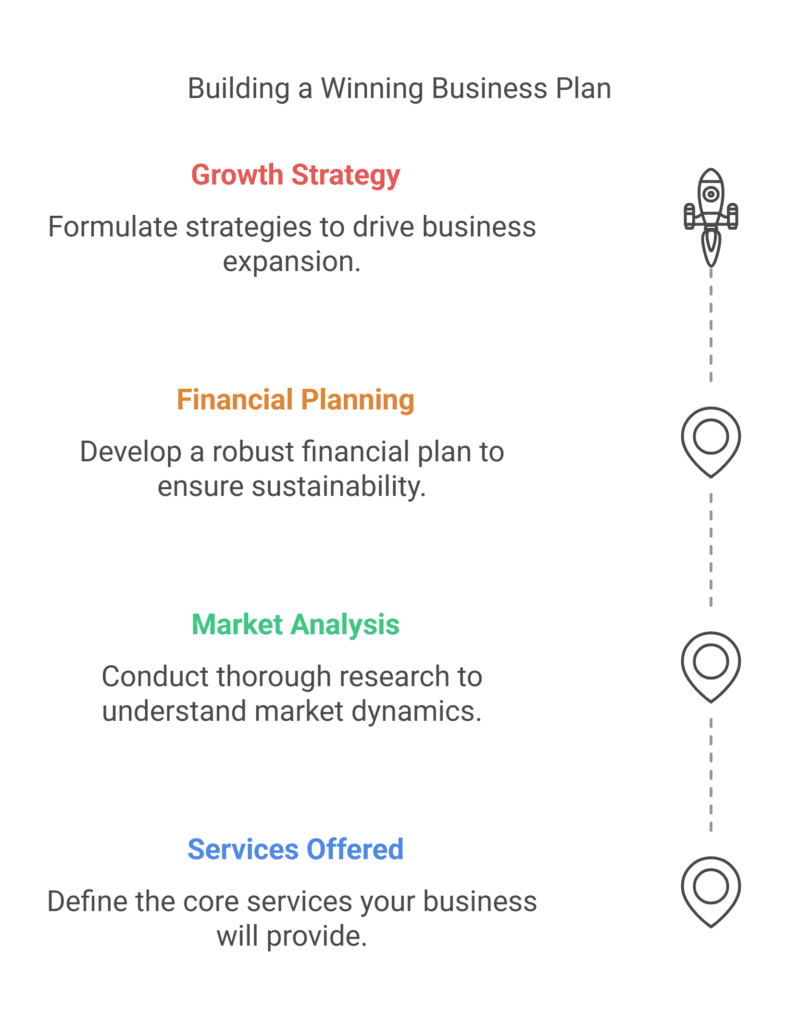
Services Offered
Clearly define the specific services your business will provide. This clarity helps potential clients understand what to expect and sets the scope of your operations. For example:
- Assisting clients in buying, selling, or renting residential properties.
- Facilitating transactions for commercial spaces like offices or retail locations.
- Managing rental properties, including tenant relations and maintenance.
Market Analysis
Understand the dynamics of your target area and identify your competitors. This involves researching local market trends, property values, and customer demographics. Knowing your market helps in tailoring your services to meet client needs effectively.
Financial Planning
Outline your budget, funding sources, and projected earnings. Detail your startup costs, expected revenue streams, and financial goals. This financial roadmap will guide your spending and help in securing funding from investors or lenders.
Growth Strategy
Plan how you’ll expand your business over time. This could include strategies like entering new markets, offering additional services, or forming partnerships. Setting clear milestones will help track your progress and keep your business development on course.
Meeting Legal & Licensing Requirements
Starting a real estate business in Canada involves a few key steps to ensure you’re operating legally and building trust with your clients. Let’s break it down in simple terms:
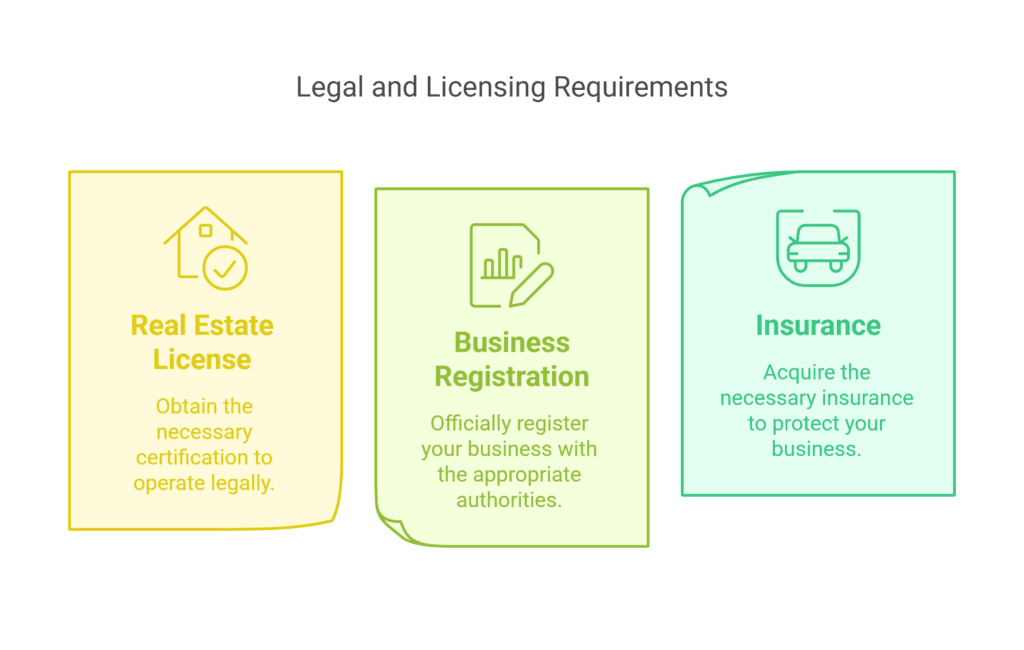
Get Your Real Estate License
Each province or territory in Canada has its own rules for becoming a real estate agent. Generally, you’ll need to take some courses and pass an exam. For example, in Ontario, you must complete the Real Estate Salesperson Program through Humber College, which is regulated by the Real Estate Council of Ontario (RECO). Once you’ve done this, you can apply for your license. It’s a good idea to check the specific requirements in your area.
Register Your Business
Decide how you want to set up your business. You can be a sole proprietor (just you), form a partnership (you and others), or create a corporation (a separate legal entity). After deciding, you’ll need to register your business name and get any necessary permits. The Government of Canada has resources to help you with this process.
Get the Right Insurance
Protecting your business is important. Consider getting Errors and Omissions (E&O) insurance, which can help if a client claims you’ve made a mistake. Also, look into general liability insurance to cover other potential issues.
Building Your Brand and Online Presence
Building a strong brand and online presence is essential for standing out in the real estate market. Here’s how you can achieve this:
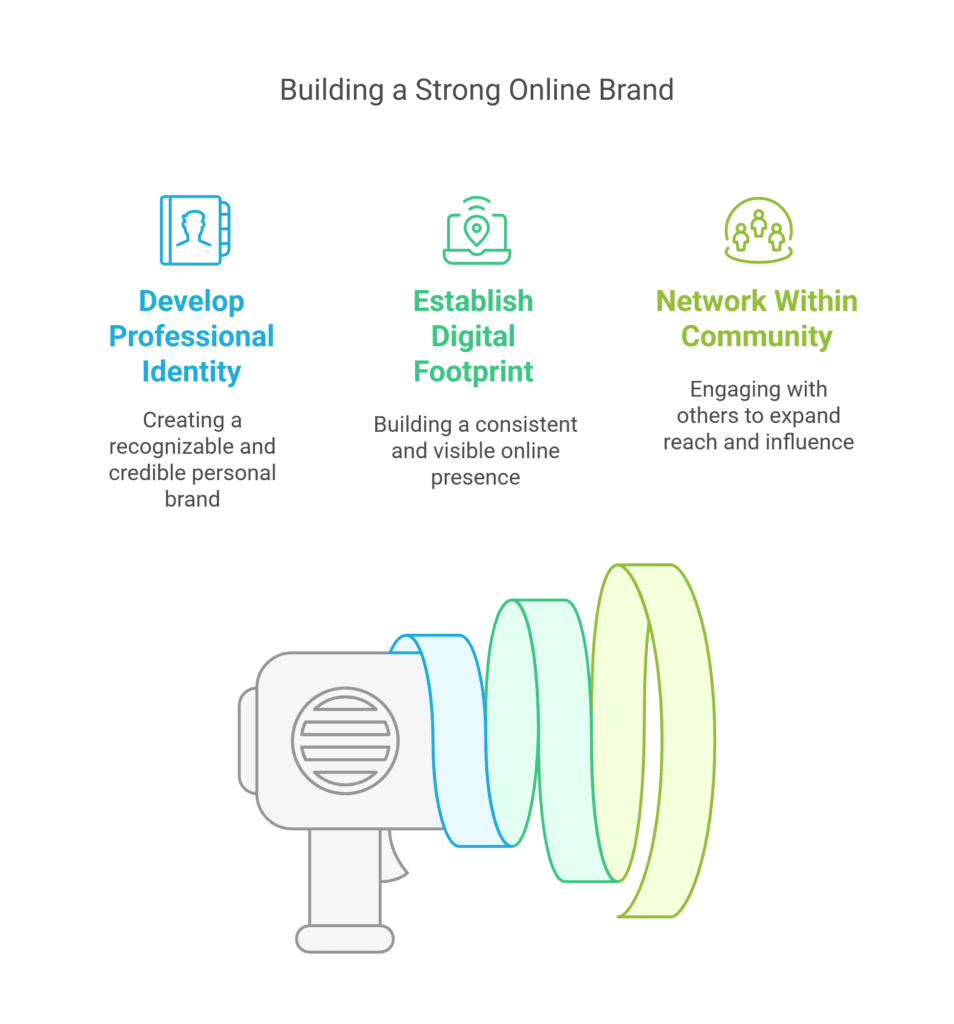
Develop a Professional Identity
- Create a Memorable Logo: Design a unique logo that reflects your business values and appeals to your target audience.
- Consistent Marketing Materials: Ensure all your marketing materials, from business cards to brochures, have a cohesive look and feel.
Establish Your Digital Footprint
- Engaging Website: Build a user-friendly website that showcases your services, listings, and client testimonials. Regularly update it with valuable content to keep visitors engaged.
- Active Social Media Profiles: Maintain profiles on platforms like Facebook, Instagram, and LinkedIn. Share updates, market insights, and engage with your audience to build relationships.
Network Within the Community
- Join Local Business Groups: Participate in local business associations to connect with other professionals and potential clients.
- Real Estate Associations: Become a member of real estate associations to stay informed about industry trends and expand your professional network.
Organizing Operations and Managing Finances
Organizing your operations and managing finances effectively are crucial steps in building a successful real estate business in Canada. Here’s a straightforward guide to help you:
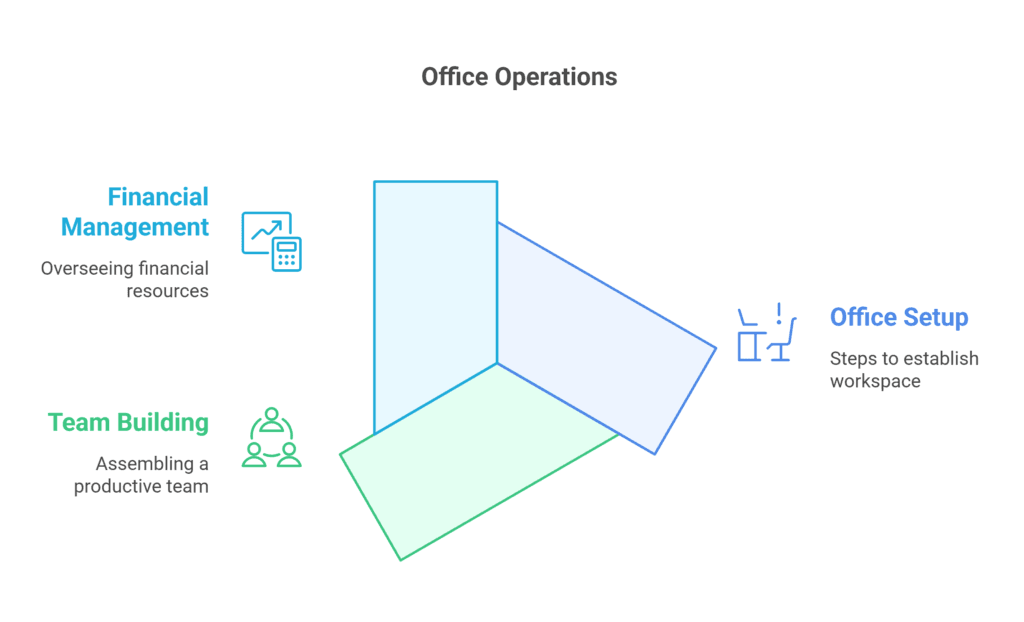
Setting Up Your Office
- Choose Your Workspace: Decide whether you’ll work from home or rent an office space. Working from home can save money, but having a dedicated office might present a more professional image to clients.
- Equip Your Office: Ensure you have the necessary tools, such as a reliable computer, phone, and internet connection. Invest in real estate software to help manage listings and client information efficiently.
Building Your Team
- Assess Your Needs: Determine which tasks you can handle and where you might need assistance. This could include administrative support, marketing, or property management.
- Hire the Right People: Look for individuals with experience in real estate or related fields. Even if you’re starting small, having dependable support can make a significant difference.
Managing Your Finances
- Keep Detailed Records: Maintain accurate records of all income and expenses. This practice is essential for tracking your business’s financial health and is crucial during tax season.
- Separate Business and Personal Finances: Open a dedicated business bank account to keep your personal and business finances separate. This separation simplifies accounting and helps maintain clear financial records.
- Plan for Taxes: Set aside a portion of your income for taxes to avoid surprises later. Consider consulting with a tax professional familiar with Canadian real estate regulations to ensure compliance and optimize your tax strategy.
Finding and Working with Clients
Building a strong client base is essential for the success of your real estate business. Here’s how you can attract and serve clients effectively:
Lead Generation
- Personal Network: Inform friends and family about your services; their referrals can be invaluable.
- Social Media: Share engaging content on platforms like Facebook and Instagram to connect with potential clients.
- Community Involvement: Attend local events to meet people and promote your business.
Client Relations
- Clear Communication: Keep clients updated throughout the process to build trust.
- Personalized Service: Tailor your approach to meet each client’s unique needs.
- Feedback: After transactions, ask for feedback to improve your services.
Conclusion
Starting a real estate business in Canada doesn’t have to be complicated or costly. The key is choosing a niche that matches your skills, market demand, and long-term goals.
Whether you’re helping first-time homebuyers, investing in properties, or managing rentals, real estate offers endless opportunities for those willing to put in the effort. And the best part? You don’t have to quit your day job to start. Many successful investors and agents start part-time and scale their businesses over time.
Now is the time to take action. Choose your niche, build your strategy, and start making your real estate business a reality. The opportunities are there will you take the first step?





